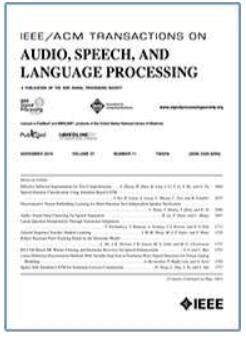定向偏置声场记录的最佳模态分解
IF 5.1
2区 计算机科学
Q1 ACOUSTICS
IEEE/ACM Transactions on Audio, Speech, and Language Processing
Pub Date : 2024-06-28
DOI:10.1109/TASLP.2024.3420252
引用次数: 0
摘要
声场记录旨在捕捉和保存特定区域的声场信息。通常,记录的声场被分解为一组模态的叠加。球谐函数通常被用作模态分解的基函数,它们是无方向偏差声场记录的最佳选择,但许多实际应用场景中的声场记录问题都是有方向偏差的。然而,大多数传统的方向偏置模态分解方法都不是最优的,或者在声场记录中的应用有限。本文提出了一种方向偏置声场记录的最优模态分解方法,它能使方向偏置声场记录的最小平方误差最小。本文在考虑声波分布和方向重要性的基础上,提出了模态分解的优化问题。然后,将优化问题离散化并求解,以获得模态分解的最优基函数。为了利用球形麦克风阵列估算模态系数,还推导出了相应的最优编码矩阵。最后,还介绍了一些模拟和实验来验证所提出的方法。结果表明,所提出的方法在有方向偏差的声场记录中表现良好。本文章由计算机程序翻译,如有差异,请以英文原文为准。
Optimal Modal Decomposition for Directionally Biased Sound Field Recording
Sound field recording aims to capture and preserve the information of the sound field in a specific area. Typically, the recorded sound field is decomposed as a superposition of a set of modes. Spherical harmonic functions are often used as basis functions for the modal decomposition, and they are optimal for directionally unbiased sound field recording, but the sound field recording problems in many practical application scenarios are directionally biased. However, most conventional directionally biased modal decomposition methods are non-optimal or have limited applications for sound field recording. In this paper, an optimal modal decomposition for directionally biased sound field recording is proposed, which minimizes the least-square error of the directionally biased sound field recording. This paper formulates the optimization problem of the modal decomposition with the consideration of the sound wave distribution and the directional importance. After that, the optimization problem is discretized and then solved to obtain the optimal basis functions for modal decomposition. To estimate the modal coefficients by using the spherical microphone array, the corresponding optimal encoding matrix is also derived. Finally, several simulations and experiments are presented to verify the proposed method. The results indicate that the proposed method performs well for directionally biased sound field recording.
求助全文
通过发布文献求助,成功后即可免费获取论文全文。
去求助
来源期刊

IEEE/ACM Transactions on Audio, Speech, and Language Processing
ACOUSTICS-ENGINEERING, ELECTRICAL & ELECTRONIC
CiteScore
11.30
自引率
11.10%
发文量
217
期刊介绍:
The IEEE/ACM Transactions on Audio, Speech, and Language Processing covers audio, speech and language processing and the sciences that support them. In audio processing: transducers, room acoustics, active sound control, human audition, analysis/synthesis/coding of music, and consumer audio. In speech processing: areas such as speech analysis, synthesis, coding, speech and speaker recognition, speech production and perception, and speech enhancement. In language processing: speech and text analysis, understanding, generation, dialog management, translation, summarization, question answering and document indexing and retrieval, as well as general language modeling.
 求助内容:
求助内容: 应助结果提醒方式:
应助结果提醒方式:


